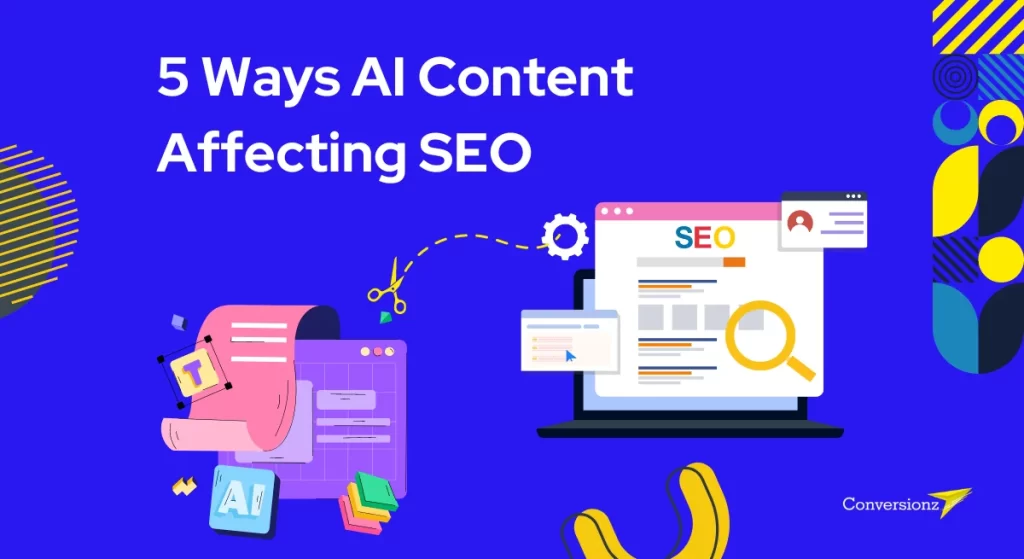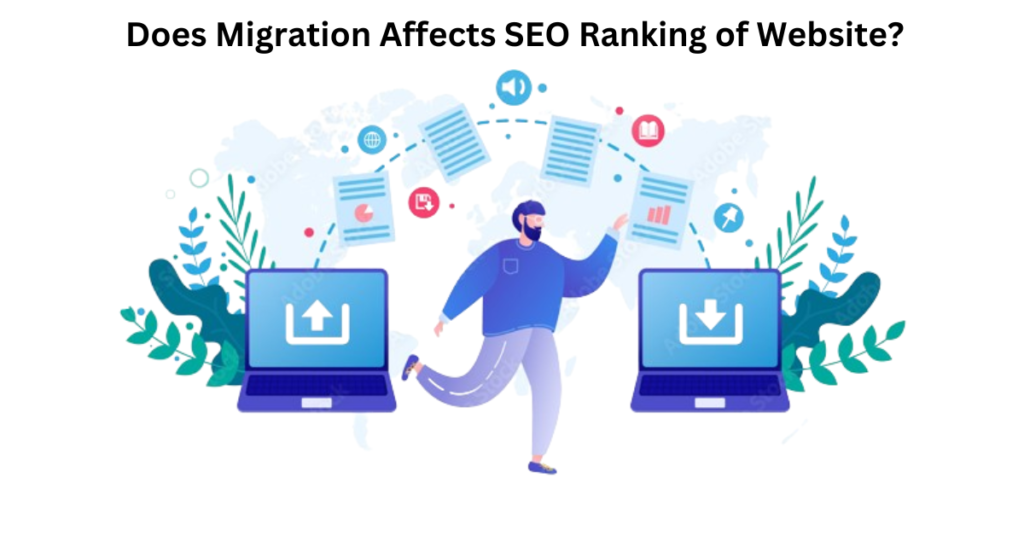Artificial intelligence (AI) is truly a part of the content creation process, with AI-written text growing more common online.
On one hand, AI presents some massive SEO opportunities; and on the other, it presents some striking risks as well.
This blog focuses on the five major ways through which AI content affecting SEO has been discussed. The blog also mentions how to avoid its adverse effects.
By knowing these implications and putting them into practice, you can reap the benefits of AI while at the same time protecting your website’s ranking in search engines.
We'll Take You Through
Is AI Content Affecting SEO? How & Why? What Can You Do?
Concern 1 of AI Content Affecting SEO: Keyword Stuffing and Poor Content Quality
The use of AI in content creation can harm SEO in two ways, i.e., by the generation of low-density content, or through keyword stuffing or overuse of keywords. AI tools such as GPT-3 can provide only high-volume low-quality content that is shallow, generic, and uninformative to its readers. Content created by AI had a 50% higher chance of being considered thin content compared to manually written content.
This over-emphasis on quantity can sometimes result in the creation of pages that barely have any meaningful content, which Google usually regards as low quality. Although Google does not punish websites for creating low-quality content, the March 2024 Google Core Update, in particular, altered the algorithm to ensure that such content is not rewarded well by the system, indicating the need to produce content that can benefit users.
AI tends to go overboard in the optimization of keywords and may end up in keyword spamming, which is a black-hat SEO technique of cramming as many keywords as possible into the website to manipulate the search results. For example, tools like the Keyword Density Tool might over-optimize content, leading to a keyword density of 1.7%, which is far above Google’s recommended threshold.
To combat these problems, it is essential to focus on the quality of the information collected and disseminated. Do not depend on AI-created content, rather use it as a helping hand, whenever you get stuck or have writer’s block, or maybe for inspiration. It is crucial to prioritize the optimization of websites specifically for the users and incorporate the actual intent and purpose of the content.
10x Your Organic Sales!
Let's explore the SEO growth opportunities for your business & to bring down the potential marketing cost
Concern 2 of AI Content Affecting SEO: Duplicate Content and Lack of Originality
The second SEO threat related to AI-generated content is the production of content that is considered duplicate or copied. AI models are trained on huge datasets, which can make the output completely mimic the earlier contents. According to a research study by the International Journal for Educational Integrity, more than 26% of the content developed using AI had traces of other online content.
Duplicate content whether it is done deliberately or not can be damaging to SEO. The information that is a replica of some other content found on another website can lower the ranking of the prior website in search engine listings. Google Updates like the March 2024 Google Core Update have sought to reinforce originality and value in terms of usefulness as highlighted above.
To avoid replication issues and ensure uniqueness throughout and uniformly in any given content format, AI should be employed as an inspiration rather than a directive instrument. Manual control and review of content are essential to introduce the individuality and prognosis for more attractive and appropriate content. Originally, the best way to reduce future issues could be facilitated by proofreading and double-checking the provided content using an AI tool.
Using AI-plagiarism detection tools like Copyleaks can assist in revealing AI-generated content that already exists over the web. Nonetheless, focusing on the user’s intent and experience remains critical. That way, originality can be preserved and duplicate content can be eliminated because you are producing content useful to users and presented from a new vantage point.
Concern 3 of AI Content Affecting SEO: E-A-T Concerns
E-A-T (Expertise, Authoritativeness, Trustworthiness) principles are one of the most essential Google requirements to rank high. Websites that show great E-A-T signals can be trusted by both, i.e., the search engines and the visitors. Nonetheless, generating content with the help of AI technologies can be problematic when building and sustaining the E-A-T authority.
AI models are considered efficient information processors with poor background knowledge and experience to support them. One research conducted by MIT revealed that more than 90% of users preferred content written by a human professional rather than AI.
Content created through AI might not easily foster the trust of the users, as users easily understand the difference between human-written content and AI-generated content. The manually created information is more valued by the users due to the perceived credibility of the material. According to a Business Today survey, 59% of the participants doubted the credibility of AI-generated content.
To mitigate this issue, there should be an emphasis on human input in the writing process. Though AI tools can be quite helpful in the content-generating process, the writer must come up with articles that show mastery in the said area of focus.
Backlinks and citation building can help in the creation of high website authority. Sites like BuzzSumo can be useful in uncovering opportunities for gaining valuable backlinks. Also, developing content that is both useful and satisfying to the users can have a positive impact on E-A-T.

Concern 4 of AI Content Affecting SEO: Algorithm Updates and Penalties
Search engine algorithms are dynamic and aim at serving the user in the best possible manner. AI-generated content poses higher risks to penalties in case there is over-dependence on the system. Of course, AI is often useful, but it is important to know about the possible threats.
For example, content developed through AI might contain features that offend Google’s spam policies because of deceptive and manipulative characteristics.
To mitigate these issues, staying up-to-date with the Google algorithm changes is paramount. Tools like Semrush Sensor can help you monitor the algorithm updates and their potential impact on SEO as a whole. Moreover, there is also a need to diversify content creation approaches other than AI. To develop a stronger and longer-lasting content strategy, human involvement along with AI and user input is needed.
It is also crucial to go over the previously posted material repeatedly and update it to match the standards and importance of the present day. Tools like Ahrefs Site Audit can help you identify outdated or underperforming content. By focusing on creating high-quality, user-centric content, you can reduce the risk of penalties and improve your website’s overall SEO performance.
Concern 5 of AI Content Affecting SEO: User Engagement and User Experience
On one hand, AI makes it easier to create content but on the other hand, its use may harm users’ experience if controlled inadequately. AI content does not have the element of flow, continuity, and excitement a reader gets when reading human-created text. 76% of users reported difficulty understanding AI-generated content compared to human-written content.
Engagement in terms of overall user experience can highly influence SEO rankings. Blogging for SEO has highlighted that search engines rank sites that provide good customer experience based on factors like bounce rate, time spent by the users on a particular page, and click-through rates. A study by Baymard Institute revealed that websites with a superior user experience enjoyed 60% higher search rankings on average.
When it comes to writing for the users, there has to be a concern for the readability of the content generated through AI. Tools like Hemingway Editor can help assess content readability and identify areas for improvement. Optimizing content for different devices and screen sizes is also crucial. Responsive design also tends to guarantee a better and unified experience for the end user across the various gadgets.
The search engines will appreciate any form of user participation and may enhance the site’s ranking greatly. Incorporating elements like calls to action, social sharing buttons, and interactive content can increase user engagement and dwell time any day. Tools like Google Analytics can provide valuable insights into user behavior, helping you refine your content strategy accordingly.
So, What is the Smarter Option? Is Really AI Content Affecting SEO Negatively?
Yes, AI content affecting SEO is a real thing. Artificial intelligence has undoubtedly influenced the approach to content creation; however, when it comes to its effects on SEO, the picture is much more complex. That is why advantages such as efficiency and scalability come at a cost, including issues like thin content, low originality, E-A-T problems, algorithm penalties, and negative user experience. The secret, therefore, is the proper combination of using AI without compromising the role of professionals and quality.
AI is poised to take a significant role in SEO in the future, but it must be noted that it is not suitable for every application. The dynamics of the search engines will go on changing and therefore the basic need will be to be up to date with the changes and growth in expectations. This means that incorporating AI with their creativity enables organizations to develop content that churns out the best results with the target audience besides further improving its ranking on SERPs.




